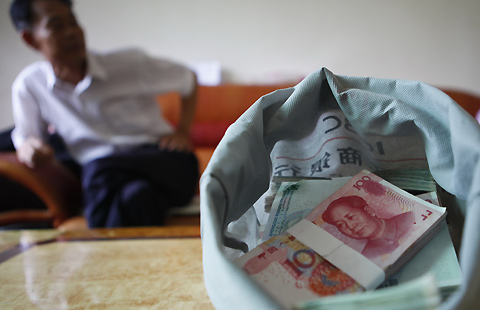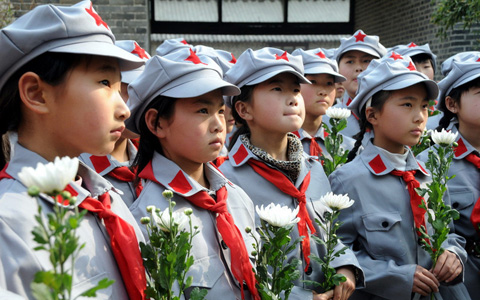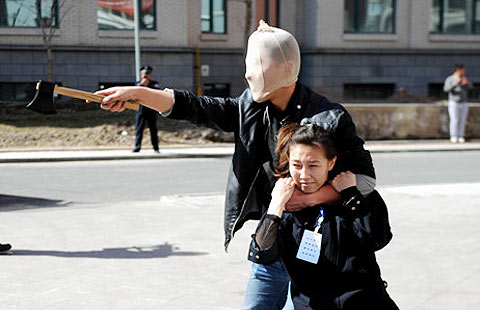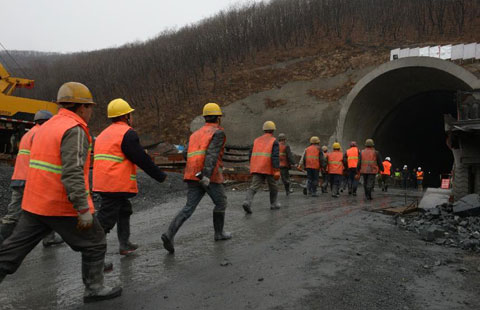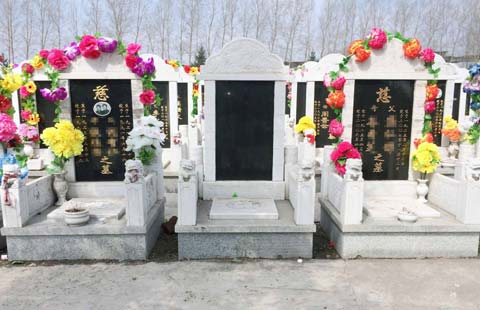

China Daily website is inviting foreigner readers to share your China Story! and here are some points that we hope will help contributors:
Different Perspectives
I've been living in China since 1993. During that time, I've lived in four different cities -- Qingdao, Shanghai, Beijing, and now Dongguan. Often, when I meet other foreigners, and we get to the inevitable, "How long have you been in China?" question, there is shock at my revelation that I've been here almost two decades. From some, there is awe and respect: "Wow, you must've seen so much happen here, you must have so many stories!". From others, there is disbelief, treating me as if I must be crazy: "My god, how could you stand it!"
 |
|
John Lombard [Photo provided to chinadaily.com.cn] |
But that's the whole point...when we are evaluating a particular situation, it is almost always done in comparison with a previous experience. Thus, for most expats in China, their point of reference is "China today compared with my country today". And the truth is that in such a comparison, China is going to come up lacking in many areas. It is a simple fact that China is still a developing economy, with rules and regulations that are still in a constant state of change and evolution. It's going to take a lot more time, and a lot more work, before things settle down and become more streamlined and predictable.
My point of reference, however, is different. Like most of my Chinese friends, I don't compare China today with Canada today; I compare China today with China in 1993, when I first came here. And by that standard, China has improved so much that it is virtually incomprehensible to anyone who didn't actually go through it. Some examples:
* In 1993, China had two different currencies: Renminbi (RMB), and Foreign Exchange Certificates (FEC). FEC was the "foreigner's currency"...when we went to the bank to change money, we couldn't buy RMB, we could only buy FEC. Officially, the exchange rate of FEC and RMB were the same; but on the street, FEC could be worth twice as much. Why?
Back in those days, a lot of luxury imported products were sold only at selected locations, like the "Friendship Store", and those locations only accepted FEC. Remember, this was back when China was only just starting to open up to the outside world, and the government was worried about too much foreign influence. They wanted to get as much money from the foreign guests as they could (and selling imported products was a good way of doing that), but they didn't want to make such decadent Capitalist products readily available to the local people. The solution was to create a two-tiered market, using two entirely different currencies, that controlled what could be bought by whom.
Of course, many Chinese wanted to buy those same imported products, but they couldn't buy FEC at the banks. So they'd buy it from foreigners, usually at a significant mark-up over the official value. Of course, such a system was doomed to fail, and in 1994 the Chinese government finally got rid of FEC entirely. Today, not only do Chinese and foreigners have equal access to all the same products, but the range and quality of products has increased dramatically.
* A little-known fact: in 1993, a foreigner could not stay in a Chinese person's home without permission from the local police. We discovered this unfortunate fact when I stayed at a friend's house overnight (his family invited me for dinner, then asked me to stay overnight after we'd drunk a lot of baijiu). One of the neighbors reported us, and at around 11:30 at night, the police showed up at our door to announce that I had to leave immediately. Fortunately, we got off with only a warning.
At that time, in fact, there were very few places that a foreigner could legally live, especially in smaller cities (I was in Qingdao at the time). There were certain areas designated for foreign occupation, and we were not allowed to rent (much less buy) a place anywhere else. Today, of course, it is completely different. We can live pretty much anywhere we want (with a very few exceptions), we can buy property, and we can visit our friends (or have them visit us) freely.
* Back then, western food was almost non-existent. The first KFC opened in Qingdao in 1994...before that, the only place to get western food was in a local 4-star hotel, and it was terribly poor quality at an insanely inflated price. In 1995, a local Chinese entrepreneur opened Qingdao's first pizza restaurant...which closed half a year later because neither the owner nor his cook had the slightest clue how to actually make pizza. Finding things as simple as cheese or butter was often next to impossible outside of Beijing and Shanghai. Every time I made a trip to Beijing, I'd buy about 20 kg of cheese, then bring it back to Qingdao and sell it (at twice the price) to my foreign friends.
Today, we find all kinds of international food in China -- not just stereotypical American foods like KFC or Pizza Hut, but French, Italian, Greek, Thai, Japanese, Korean, Indian, Russian, etc. Even in smaller cities, finding decent quality non-Chinese food is fairly easy now. And while supermarkets still don't stock everything that I'd find in a Canadian supermarket, I can generally get most of the things that I want.
Thus, for me, China today is a truly amazing place. I've seen where China's come from, and for all the problems and difficulties that still exist today, it never ceases to amaze me not only how much China has changed, but how quickly that change has taken place. There are opportunities and freedoms today that didn't exist a decade ago, much less when I first came to China. And that is much of the reason why I plan to stay here...not because everything is perfect (it's not), but because I've seen how far China has come, and am excited and eager to see where China is going.
Important Cultural Changes
One of my greatest passions is culture; I love learning about different cultures, which was one of the reasons I originally came to China. I've also been fascinated by China's minority groups, and was fascinated by one group in particular, the Mosuo. The Mosuo culture is a truly unique one: they are one of the last matriarchal cultures left in the world. But perhaps their greatest claim to fame -- and the thing that most people know about them -- is that the Mosuo culture does not practice marriage. Instead, they have a system called "walking marriage" where men and women alike can choose and change partners. It is a truly fascinating culture, one which really challenges many of our ideas about what is 'right' or 'normal'.
In 2004, I found myself with several weeks of free time, and I decided to go visit the Mosuo. I didn't want to do the typical tourist thing...just hang around a few days, take some pictures, ride some horses, and eat some local food. I wanted to experience the real Mosuo culture and day-to-day life. I ended up living in a small mountainside village, living with a local family in their home, for about three weeks. I ate with them, talked with them, and shared their daily lives with them. I was constantly asking them questions about their culture, and they were very open and eager to explain it to me. I found it absolutely fascinating, and by the end of my time there, I'd absolutely fallen in love with their culture.
Upon returning to Beijing, I felt challenged to do something to help the Mosuo. They live in one of the most impoverished and undeveloped areas of China, high in the Himalayas, and face a great many difficulties and challenges. Access to medical care is minimal or almost non-existent in some areas. Opportunities for education are extremely limited for many Mosuo children. In fact, the amount of money that I would spend going out to a bar with friends on a Friday night in Beijing was the equivalent to a year's income for some Mosuo.
So a few months later, I returned to Lugu Lake, and met with local Mosuo leaders, suggesting that we set up a non-profit charity organization to help the Mosuo accomplish their goals. It would be a 100% Mosuo organization, led and run by them...but I'd provide the money (or help find others to provide the money) to get things done. In 2005, the Lugu Lake Mosuo Cultural Development Association was officially registered in Yunnan.
However, this story is not about me, or the Mosuo (if you want to know more about that, check out our websites: English website at www.mosuoproject.org; Chinese website at www.mosuo.org.cn). This story is about how Chinese attitudes towards charity are changing and evolving in China.
You see, when I started trying to raise money to support our organization's projects, I found that most Chinese simply weren't interested. It wasn't because they didn't have enough money, many of the people I talked to were very successful businesspeople. It was because they simply felt no responsibility to help. Their reaction was generally along the lines of "I think what you're doing is really good, and I wish you lots of luck, but I'm not going to help." If you talk to other non-profit organizations in China, I'm sure you'll hear similar stories. Foreigners, by contrast, were often both interested and eager to donate money and supplies to help us out.
This led me at first to a rather cynical view of Chinese, as being selfish and only caring about themselves. But with time, I came to realize that wasn't always true. Many of my Chinese students, after they graduated university, would send the majority of their income to help their families. There were frequent stories about rich Chinese businessmen who returned to their hometowns to build schools, hospitals, etc. They weren't being selfish...so why wouldn't they help us, too?
It is because of a fundamental cultural difference. In Western culture, we tend to have a sense of equal responsibility towards everyone. That's certainly my attitude -- I'm human, and the people I help are human. I don't see it as "I'm Canadian, and they're Chinese". It is the simple fact of shared humanity that gives me a responsibility to help others, regardless of whether I know them or not. But in Chinese culture, based largely on Confucian values, there is a tendency to feel a very strong responsibility towards those close to you; but the less connected they are to you, the less responsibility you have for them. Thus, there's a very strong responsibility to help your family; a fairly strong responsibility to help friends; a moderate responsibility to help people from your hometown, or your ethnic group; etc. But for people with whom you share little or nothing in common, there is little or no responsibility to help them.
In some ways, this can be a good thing; it means that families and communities can rely more strongly on each other. But in other ways, I consider it a weakness, and a significant impediment to China's continued growth and development. China would grow much faster, and develop much more effectively, if its citizens felt a stronger responsibility to help everyone...not just the people they know.
And recently, I've been seeing a very big shift in this regard, a fundamental change in Chinese culture, particularly in the younger under-25 generation. It started with the terrible Sichuan earthquake in 2008. I've been witness to a number of tragedies in China, and prior to 2008, the reaction was always pretty much the same. The government would tell people how much money they should give, or what they should do, and they would do it. But beyond that, very few people would do anything at all. When I talked with people about it, they'd generally say, "It's the government's responsibility, not mine."
In 2008, that suddenly changed. Thousands of people from all across China -- mostly young people -- suddenly started volunteering to help. They didn't wait for the government to tell them what to do; they didn't do things just because that was what they were told they should do. They gathered food, clothes, and water to help the earthquake victims. Some of them actually traveled there to work as volunteers, helping the local people. They donated their own money, their own time, and their own energy to help people that they didn't know at all.
Since then, I've noticed a big shift in Chinese attitudes towards helping others. Among the older generation, the change is not so great; but among the younger generation, I find an entirely new perspective. I'm regularly contacted by young Chinese -- university students, or people who've just started working -- asking how they can help us, how they can get involved. Many of them don't have much money to give, but are willing to volunteer their time and energy to help us however they can.
Not only do I think that this is a very important change, but it is one that I hope serves as a challenge to the older generation of Chinese. There are all these rich, successful businesspeople who give nothing except excuses for why they won't get involved...and there are these young people, with little money or experience, offering to do whatever they can to help.
China's development and future are a constant topic of conversation, with a great many different opinions and attitudes. But there is one thing that I consider to be an absolute fact. China's growth, China's future, and China's development don't depend only on the government; it depends to a great deal on China's people, as well. There are a great many people in China who have money...but a great many more who do not. And if those who have money felt a larger sense of responsibility to help others in greater need -- not because the government tells them to, but because they feel it is their personal responsibility to do so -- China would develop much faster.
It is China's youth who give me real hope for China's future, because they are developing a perspective that is more universal, that doesn't focus only on their immediate situation, but on the whole of China (and even the rest of the world).
The author is a Canadian and he came to China in 1993. John was the founder and president of the first Toastmasters club in Beijing (www.chinatoastmasters.org), and he was also the co-founder of a non-profit organization working with one of China's minority groups, the Mosuo (www.mosuoproject.org). He worked as a columnist for the 21st Century newspaper back in 1996 or 1997, writing about cultural differences between China and western culture. John was the personal speech trainer for the Mayor of Beijing, Liu Qi, during the bid for the 2008 Olympic Games.
The opinions expressed do not represent the views of the China Daily website.
[Please click here to read more My China stories. You are welcome to share your China stories with China Daily website readers. The authors will be paid 200 yuan ($30). Please send your story to mychinastory@chinadaily.com.cn.]


